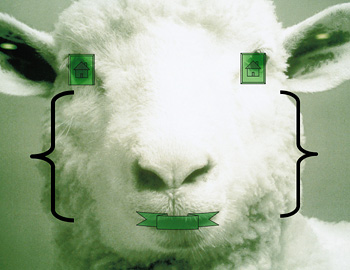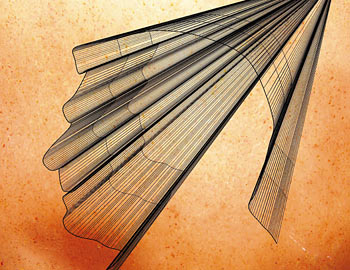
E.E.E.I. |
"Learning to Love PowerPoint" A while ago, I decided to base the book-tour readings from my pseudoreligious tract The New Sins on sales presentations. I was going for a fair dose of irony and satire, and what could be better than using PowerPoint and a projector, the same tools that every sales and marketing person relies on? Having never used the program before, I found it limiting, inflexible, and biased, like most software. On top of that, PowerPoint makes hilariously bad-looking visuals. But that's a small price to pay for ease and utility. We live in a world where convenience beats quality every time. It was, for my purposes, perfect. I began to see PowerPoint as a metaprogram, one that organizes and presents stuff created in other applications. Initially, I made presentations about presentations; they were almost completely without content. The content, I learned, was in the medium itself. I discovered that I could attach my photographs, short videos, scanned images, and music. What's more, the application can be made to run by itself — no one even needs to be at the podium. How fantastic! Although I began by making fun of the medium, I soon realized I could actually create things that were beautiful. I could bend the program to my own whim and use it as an artistic agent. The pieces became like short films: Some were sweet, some were scary, and some were mysterioso. I discovered that even without text, I could make works that were "about" something, something beyond themselves, and that they could even have emotional resonance. What had I stumbled upon? Surely some techie or computer artist was already using this dumb program as an artistic medium. I couldn't really have this territory all to myself — or could I?
"In thinking about graphic design, industrial design, and what might really be the cutting-edge of design, I realized it would have to be genetic engineering. Dolly (God rest her soul) represents the latest in design, but it is, in her case, design we cannot see. Dolly looks like any other sheep, which is precisely the point. The dogma of some graphic designers is that their work be invisible. This perfection has been achieved with Dolly."
"I began this project making fun of the iconography of PowerPoint, which wasn't hard to do, but soon realized that the pieces were taking on lives of their own. This whirlwind of arrows, pointing everywhere and nowhere -each one color-coded to represent God knows what aspects of growth, market share, or regional trends — ends up capturing the excitement and pleasant confusion of the marketplace, the everyday street, personal relationships, and the simultaneity of multitasking. Does it really do all that? If you imagine you are inside there it does."
"This is Dan Rather's profile. Expanded to the nth degree. Taken to infinity. Overlayed on the back of Patrick Stewart's head. It's recombinant phrenology. The elements of phrenology recombined in ways that follow the rules of irrational logic, a rigorous methodology that follows nonrational rules. It is a structure for following your intuition and your obsessions. It is the hyperfocused scribblings of the mad and the gifted. The order and structure give it the appearance of rationality and scientific rigor. This appearance is easy to emulate. Phrenology sought to reveal criminal propensities — and those of potential leaders and geniuses — in the shapes and bumps of the head and face. Nowadays we see it as a scientific justification for racist and cultural biases. A dangerous pseudoscience. But if phrenology was the genetic profiling of a previous era, what will supplant genetic profiling when that too appears as ridiculous as phrenology does to us now? Nonrational logic will not go away." David Byrne's Envisioning Emotional Epistemological Information, a book and DVD in which these images appear, will be published in September by Steidl and Pace/MacGill Gallery. His new album, Lead Us Not Into Temptation (Music From the Film Young Adam), also comes out this month.
|





